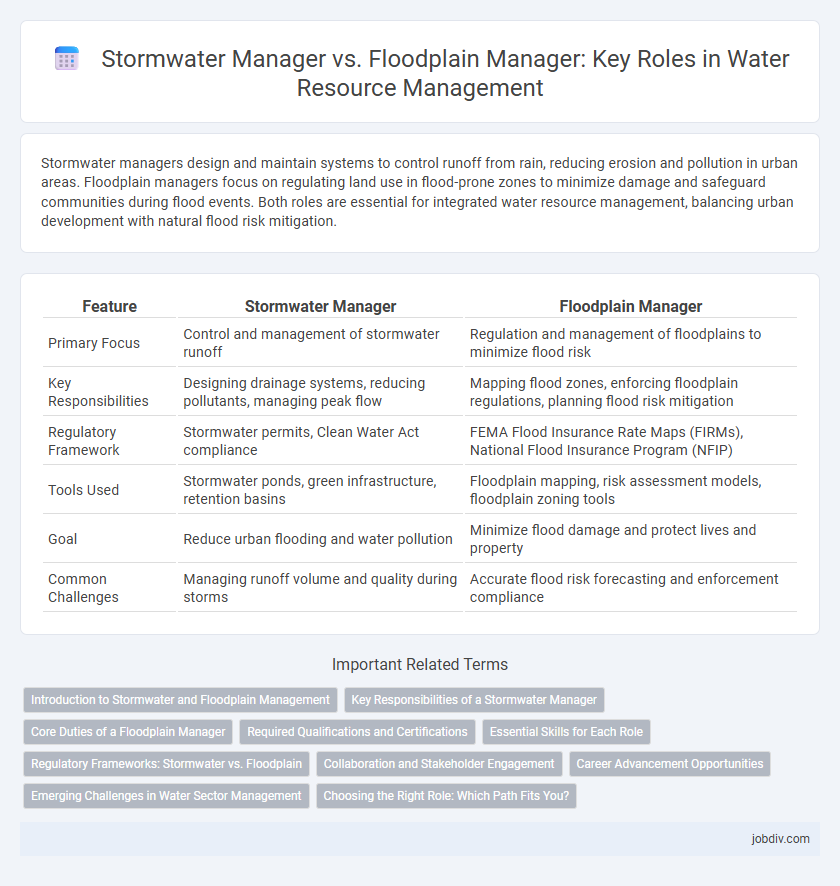Stormwater managers design and maintain systems to control runoff from rain, reducing erosion and pollution in urban areas. Floodplain managers focus on regulating land use in flood-prone zones to minimize damage and safeguard communities during flood events. Both roles are essential for integrated water resource management, balancing urban development with natural flood risk mitigation.
Table of Comparison
| Feature | Stormwater Manager | Floodplain Manager |
|---|---|---|
| Primary Focus | Control and management of stormwater runoff | Regulation and management of floodplains to minimize flood risk |
| Key Responsibilities | Designing drainage systems, reducing pollutants, managing peak flow | Mapping flood zones, enforcing floodplain regulations, planning flood risk mitigation |
| Regulatory Framework | Stormwater permits, Clean Water Act compliance | FEMA Flood Insurance Rate Maps (FIRMs), National Flood Insurance Program (NFIP) |
| Tools Used | Stormwater ponds, green infrastructure, retention basins | Floodplain mapping, risk assessment models, floodplain zoning tools |
| Goal | Reduce urban flooding and water pollution | Minimize flood damage and protect lives and property |
| Common Challenges | Managing runoff volume and quality during storms | Accurate flood risk forecasting and enforcement compliance |
Introduction to Stormwater and Floodplain Management
Stormwater management involves controlling runoff to prevent erosion, reduce pollution, and protect water quality through infrastructure like retention ponds and green roofs. Floodplain management focuses on regulating land use in flood-prone areas to minimize flood damage, enforce building codes, and implement zoning restrictions. Both disciplines integrate hydrological data, environmental regulations, and urban planning to safeguard communities and ecosystems from water-related hazards.
Key Responsibilities of a Stormwater Manager
A Stormwater Manager is primarily responsible for designing, implementing, and maintaining systems that control surface water runoff to reduce flooding, erosion, and pollution. Their duties include developing stormwater management plans, ensuring compliance with environmental regulations, and monitoring water quality. This role often involves coordinating with municipal agencies to protect infrastructure and natural water bodies from stormwater impacts.
Core Duties of a Floodplain Manager
Floodplain Managers are responsible for identifying and mapping flood-prone areas, enforcing regulations that restrict development in these zones to minimize flood risk, and coordinating disaster response and recovery efforts related to flooding events. Their core duties also include educating communities about flood hazards, managing flood insurance programs, and collaborating with environmental agencies to implement sustainable land-use practices. These actions collectively reduce flood damage, protect lives, and support resilient infrastructure in vulnerable areas.
Required Qualifications and Certifications
Stormwater Managers typically require certifications such as Certified Stormwater Manager (CSM) or Professional Engineer (PE) with experience in stormwater design and management, emphasizing knowledge of drainage systems, erosion control, and water quality regulations. Floodplain Managers often obtain Certified Floodplain Manager (CFM) credentials, highlighting expertise in floodplain mapping, risk assessment, and compliance with FEMA regulations and the National Flood Insurance Program (NFIP). Both roles may demand degrees in environmental science, civil engineering, or related fields, but their certifications reflect distinct focuses on either stormwater infrastructure or floodplain risk management.
Essential Skills for Each Role
Stormwater managers specialize in hydrological modeling, drainage system design, and water quality control to mitigate urban runoff and enhance stormwater infrastructure. Floodplain managers require strong expertise in flood risk assessment, land-use planning, and regulatory compliance to protect communities from flood hazards and manage floodplain zoning. Both roles demand proficiency in GIS technology, data analysis, and emergency response coordination for effective water resource management.
Regulatory Frameworks: Stormwater vs. Floodplain
Stormwater managers operate within regulatory frameworks emphasizing the control and treatment of runoff to reduce pollution under the Clean Water Act's National Pollutant Discharge Elimination System (NPDES) permits. Floodplain managers focus on compliance with the National Flood Insurance Program (NFIP) regulations, which mandate land use planning and building standards to mitigate flood risks. Coordination between these regulatory approaches is essential for integrated water resources management and community resilience.
Collaboration and Stakeholder Engagement
Stormwater Managers coordinate with engineers, urban planners, and environmental agencies to design effective drainage systems that mitigate runoff and improve water quality. Floodplain Managers engage local governments, emergency responders, and community members to develop risk assessments and land-use policies that reduce flood impacts. Collaboration between these roles enhances stakeholder engagement by integrating stormwater control measures with floodplain management plans, ensuring resilient infrastructure and informed public participation.
Career Advancement Opportunities
Stormwater Managers specialize in designing and implementing systems that control runoff and improve water quality, offering career advancement in urban planning, environmental engineering, and infrastructure development. Floodplain Managers focus on assessing and mitigating flood risks through regulatory compliance and land use management, providing pathways to leadership roles in emergency management, government agencies, and disaster resilience planning. Both careers benefit from certifications such as the Certified Floodplain Manager (CFM) and Professional Engineer (PE), which enhance professional credibility and open opportunities for higher responsibility and salary growth.
Emerging Challenges in Water Sector Management
Stormwater managers face emerging challenges such as increased urbanization and climate change-induced intense rainfall, requiring advanced green infrastructure and real-time monitoring technologies to mitigate runoff and pollution. Floodplain managers must adapt to shifting flood risks caused by sea-level rise and altered hydrological patterns, emphasizing updated floodplain mapping and resilient land-use planning. Both roles demand integrated data analytics and collaborative governance to enhance adaptive capacity in water sector management.
Choosing the Right Role: Which Path Fits You?
Stormwater Managers specialize in designing and implementing systems to control runoff, prevent erosion, and improve water quality in urban landscapes. Floodplain Managers focus on regulating land use within flood-prone areas to reduce risk, enforce zoning laws, and enhance community resilience against flooding events. Selecting the right role depends on your interest in either infrastructure-based water management or strategic planning for flood risk mitigation.
Stormwater Manager vs Floodplain Manager Infographic

 jobdiv.com
jobdiv.com